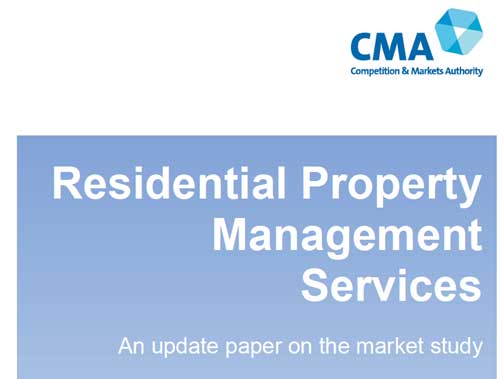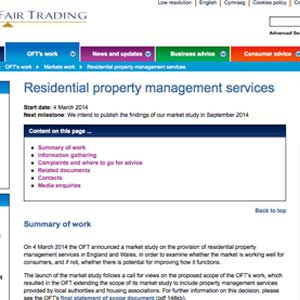… But it wants further feedback, so let them have it!
… Oh, and oldies are happier than those in non-retirement flats
 The Competition and Markets Authority (CMA) has today issued an update on its market study (see below) into the provision of residential property management services in England and Wales.
The Competition and Markets Authority (CMA) has today issued an update on its market study (see below) into the provision of residential property management services in England and Wales.
LKP / Campaign against retirement leasehold exploitation applauds this study and the work of those behind it. The CMA has understood many of the issues and does not seem to have been hoodwinked by the sector, its assorted trade bodies, hastily issued codes of practice, customer charters, PR blow-hards and similar.
It was very welcome that the CMA dismissed a favoured nonsense of Michelle Banks, of ARMA, and the bilius Jeff Platt of the Institute of Residential Property Managers:
“… we found limited and mainly anecdotal evidence to support the allegation that non-trade-association property managers are responsible for the majority of problems that occur in the RPMS market.”
In January, Platt, an apologist of the status quo, promised to supply evidence to the CMA of bullying by right to manage activists in retirement developments.
That utterly piffling and dubious point does not seem to have seen light of day in the CMA report.
We will study this in depth, but there is an alarming reference for Campaign against retirement leasehold exploitation readers: those in retirement flats are more content with their lot than those in non-retirement sites, according to a poll the CMA ran.
In what will bring tears of joy to retirement housing managers and those philanthropists who have bought up retirement freeholds at auctions, the CMA reports:
“We noted that some concerns expressed at the outset of the study have not been supported by the evidence we have collected:
● We have considered whether residents of leasehold retirement properties may be particularly vulnerable to adverse outcomes, and whether the provision of specialist services could raise the potential for additional harmful practices (such as aspects of charging in relation to alarm and security systems or the provision of accommodation for on-site managers).
However, we received few complaints specific to retirement property issues, and according to our leaseholder survey, leaseholders in retirement properties had higher levels of satisfaction than other leaseholders with property management services.
LKP / Campaign against retirement leasehold exploitation was a bit surprised when forewarned of this, but not unduly.
Only a minority in retirement housing have the will and capacity to understand the leasehold game – often played here by sophisticated corporate interests – and even fewer are in a position to do anything about it.
This means that when a retirement site opts for right to manage, something has usually gone spectacularly wrong.
There is plenty of evidence about retirement leasehold in the court records, the two OFT reports and Campaign against retirement leasehold exploitation itself, for the CMA to be going on with.
But you must ensure that your concerns are heard, so please do write to the CMA here:
propertymanagers.study@cma.gsi.gov.uk
The CMA study, which was launched in March 2014 by the CMA’s predecessor the Office of Fair Trading (OFT), is looking at whether the market is working well for leaseholders and whether there is effective competition in the sector.
Broadly, The CMA has identified a number of causes for concern about how the market works. Some leaseholders appear to suffer from a lack of control over aspects of property management, and may experience excessive or unnecessary charging for services arranged by property managers, poor service quality, insufficient transparency, poor communication and ineffective redress.
At the same time, other leaseholders are satisfied with their property management services and the CMA has found evidence to suggest that the existing checks and balances in the market can work well.
In light of this, the CMA has set out some views on possible remedial action to improve the performance of the market and secure better outcomes for leaseholders, on which it is seeking views.
Rachel Merelie, Senior Director of Delivery, said:
‘Whilst the market works well for some leaseholders, our emerging findings suggest that improvements may be needed in a number of areas. Given the broad range of issues we are considering, we have decided to seek views at this stage on a range of possible remedies to the problems we have identified. This will help us to develop recommendations that are both effective and proportionate.’
All comments should be sent by September 19 2014 to:
Residential Property Management Services Study Competition and Markets Authority
Victoria House
37 Southampton Row
London,
WC1B 4AD
propertymanagers.study@cma.gsi.gov.uk
The CMA will publish its full report by the end of 2014.
The full update report can be read here:





 ARHM’s pathetic response to the Peverel / Cirrus scandal
ARHM’s pathetic response to the Peverel / Cirrus scandal






















All comments should be sent by September 19 2014
Mine is already to be posted, 1st August 2014
I hope mine is the first of many.
Norman,
Hope you are well mate, good of you comment and help the troops.
On the homes for seasoned citizens being happier, rather than speculate that it has something to do with medication or willingness, it might be better to put it into a further context.
A lot of the properties are, relatively speaking, new, and therefore while some are no doubt being quietly exploited (and some are not) the manifest examples of the security and access systems, as major works, are unlikely to arise for some time.
I have in the past expressed my concern that in regard to the IRPM, an omission from the training material at part one or two is ethical and moral behaviors, something which is offered in degree and distance learning leading to RICS membership.
Whether or not professional body member act in this way, those at the coal face are nevertheless pressed and tutored( those in a meetings is really a sales course) to train and target income generation and cross selling.
Everyone is out to make money, but its the way that you do it, the absence of boundaries and whose interest that you serving, that is missing.
Whether it is not in the client or residents interest is one thing, but if you miss “your “targets its not in “your “( the coalface worker) interest.
I might mention that the problem of performance is sometimes quite basic – ARMA and RICS members firms still issuing old outdated summaries of rights, including one mentioned on L:KP, according to one of the residents ,who is therefore under the Act, withholding their payment.
It is rather desperate to see this time after time, and while you can expect it of little old lady downstairs freeholder not to be scouring egi every week, these firms are aware of it. Or that Wales has its own rules!
There are a couple of howlers in the report ( and a major flaw in understanding) but the overall to do list is sound- especially as a couple are mine 😀
What I and I hope others will think about is how you get a buyer and owners to access the new understanding and rights. After all if they often don’t use the existing ones how do you them to use new ones?
Many freeholders and agents will rub their hands and think “yay more fees” and that will spur compliance and a dab of profiteering, but once again we need to think about how we get the information and the requirement delivered to the small freeholder or RMC/RTM and get them to comply.
Don’t forget that if agents have to be more open and transparent and regularly report on their procurement and resulting expenses, then the self managing freeholder and residents group will have to do so too.
Without wishing to impose on your generosity, perhaps you could explain what the “major flaw in understanding” and the alleged howlers involve? Please do include reference to your own doubtless agenda-setting contributions to the CMA report.
Seb,
AM is right there couple of issues in the report. The wrong use of the word “tenant” being one but am aware the CMA understands that particular problem.
What strikes me from the report is that a number of the proposals will still need changes to primary legislation even if they start off as points the sector might in theory self regulate.
It would be useful to know what AM has spotted.
Commonhold, Leasehold, Freehold – call it what you like. Doubtless, there will always be rules to safeguard majority interests, irrespective of the legal structure. Equally, people will always look for ways around those rules: managing agents spring to mind.
So, whatever the rules (and less is probably more … given that flat owners do need to know what those rules are if they are to benefit), then ENFORCEMENT of those rules must surely be key to achieving fairness and equilibrium across the property management sector currently being investigated by the CMA.
Who will enforce the rules? Can we rely on self-regulation? [ARMA-Q where are you? I’m still waiting to hear about my complaint acknowledged by you, relating to your high-profile member submitted mid 2012. Or do high-profile members enjoy special string-pulling powers?]
ARMA can be in little doubt that its own members sail so close to the wind that, if it were not for the grace of God and no amount of palm-greasing, they would capsize. Ditto RCIS’ members.
On the other hand, it looks like the accountants have decided to ‘go straight’. Bravo! Under the auspices of the Financial Services Authority’s FRED 50 study into Resident Management Companies’ Financial Statements, ICAEW and others are proposing greater transparency in service charge accounts.
In simple terms, if it goes through then flat management companies and their managing agents will have to publish their income and expenditure figures at Companies House. And, as in the old days, flat owners will be able to check what they are paying their managing agent against the charges being made by their competitors.
That’s got to be good for competition in the property management sector. CMA – over to you.